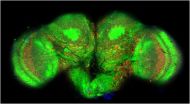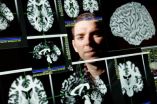(Press-News.org) Being awake at night and dozing during the day can be a distressing early symptom of Alzheimer's disease, but how the disease disrupts our biological clocks to cause these symptoms has remained elusive.
Now, scientists from Cambridge have discovered that in fruit flies with Alzheimer's the biological clock is still ticking but has become uncoupled from the sleep-wake cycle it usually regulates. The findings – published in Disease Models & Mechanisms – could help develop more effective ways to improve sleep patterns in people with the disease.
People with Alzheimer's often have poor biological rhythms, something that is a burden for both patients and their carers. Periods of sleep become shorter and more fragmented, resulting in periods of wakefulness at night and snoozing during the day. They can also become restless and agitated in the late afternoon and early evening, something known as 'sundowning'.
Biological clocks go hand in hand with life, and are found in everything from single celled organisms to fruit flies and humans. They are vital because they allow organisms to synchronise their biology to the day-night changes in their environments.
Until now, however, it has been unclear how Alzheimer's disrupts the biological clock. According to Dr Damian Crowther of Cambridge's Department of Genetics, one of the study's authors: "We wanted to know whether people with Alzheimer's disease have a poor behavioural rhythm because they have a clock that's stopped ticking or they have stopped responding to the clock."
The team worked with fruit flies – a key species for studying Alzheimer's. Evidence suggests that the A-beta peptide, a protein, is behind at least the initial stages of the disease in humans. This has been replicated in fruit flies by introducing the human gene that produces this peptide.
Taking a group of healthy flies and a group with this feature of Alzheimer's, the researchers studied sleep-wake patterns in the flies, and how well their biological clocks were working.
They measured sleep-wake patterns by fitting a small infrared beam, similar to movement sensors in burglar alarms, to the glass tubes housing the flies. When the flies were awake and moving, they broke the beam and these breaks in the beam were counted and recorded.
To study the flies' biological clocks, the researchers attached the protein luciferase – an enzyme that emits light – to one of the proteins that forms part of the biological clock. Levels of the protein rise and fall during the night and day, and the glowing protein provided a way of tracing the flies' internal clock.
"This lets us see the brain glowing brighter at night and less during the day, and that's the biological clock shown as a glowing brain. It's beautiful to be able to study first hand in the same organism the molecular working of the clock and the corresponding behaviours," Dr Crowther said.
They found that healthy flies were active during the day and slept at night, whereas those with Alzheimer's sleep and wake randomly. Crucially, however, the diurnal patterns of the luciferase-tagged protein were the same in both healthy and diseased flies, showing that the biological clock still ticks in flies with Alzheimer's.
"Until now, the prevailing view was that Alzheimer's destroyed the biological clock," said Crowther.
"What we have shown in flies with Alzheimer's is that the clock is still ticking but is being ignored by other parts of the brain and body that govern behaviour. If we can understand this, it could help us develop new therapies to tackle sleep disturbances in people with Alzheimer's."
Dr Simon Ridley, Head of Research at Alzheimer's Research UK, who helped to fund the study, said: "Understanding the biology behind distressing symptoms like sleep problems is important to guide the development of new approaches to manage or treat them. This study sheds more light on the how features of Alzheimer's can affect the molecular mechanisms controlling sleep-wake cycles in flies.
"We hope these results can guide further studies in people to ensure that progress is made for the half a million people in the UK with the disease."
INFORMATION: END
Scientists wake up to causes of sleep disruption in Alzheimer's disease
2014-02-27
ELSE PRESS RELEASES FROM THIS DATE:
Over 80s often over-treated for stroke prevention
2014-02-27
People in their 80s are often prescribed drugs to ward off a stroke when the risk of a stroke is not that high and the drugs have other side effects, finds a perspective published online in Evidence Based Medicine.
People in this age group are being "over-treated," and doctors need to actively rethink their priorities and beliefs about stroke prevention, argues Dr Kit Byatt of the Department of Geriatric Medicine, The County Hospital in Hereford, UK.
Statins and antihypertensive drugs were the most commonly prescribed cardiovascular drugs in the UK in 2006. And they ...
Mental health of most UK troops serving in Afghanistan and Iraq is 'resilient'
2014-02-27
Despite prolonged combat missions to Iraq and Afghanistan, there has been no overall increase in mental health problems among UK soldiers, finds a review of the available evidence, published online in the Journal of the Royal Army Medical Corps.
But certain groups of soldiers do seem to be more vulnerable to mental ill health on their return home, while alcohol problems continue to give cause for concern among regulars, say the researchers from King's College London.
They retrieved published research looking at the psychological impact of deployment to Iraq and Afghanistan ...
Passive smoking linked to increased miscarriage, stillbirth, and ectopic pregnancy risk
2014-02-27
Passive smoking is linked to a significantly increased risk of miscarriage, stillbirth and ectopic pregnancy, finds a large observational study, published online in Tobacco Control.
The risk appears to be cumulative, with risk heightened in parallel with the length of time exposed to second hand smoke, the findings indicate.
It is well known that smoking during pregnancy significantly increases the risks of miscarriage and birth complications. What is less clear is whether passive smoking exerts similar effects, and if there are particularly critical periods of exposure ...
Spotted seal study reveals sensitive hearing in air and water
2014-02-27
Two spotted seals orphaned as pups in the Arctic are now thriving at UC Santa Cruz's Long Marine Laboratory, giving scientists a rare opportunity to learn about how these seals perceive their environment. In a comprehensive study of the hearing abilities of spotted seals, UCSC researchers found that the seals have remarkably sensitive hearing in both air and water.
The findings, published February 26 in the Journal of Experimental Biology, are important for understanding how spotted seals might be affected by noise from human activities in the rapidly changing Arctic ...
Secondhand smoke exposure linked to adverse pregnancy outcomes
2014-02-27
BUFFALO, N.Y. — Secondhand smoking is linked with pregnancy loss, including miscarriage, stillbirth and tubal ectopic pregnancy, according to new research from scientists at Roswell Park Cancer Institute (RPCI) and the University at Buffalo (UB). The study findings, published online by the journal Tobacco Control, mark a significant step toward clarifying the risks of secondhand smoke exposure.
"This study demonstrated that pregnancy outcomes can be correlated with secondhand smoking. Significantly, women who have never smoked but were exposed to secondhand smoke were ...
Febrile illnesses in children most often due to viral infections
2014-02-27
This news release is available in German. Most children ill with fever in Tanzania suffer from a viral infection, a new study published in the New England Journal of Medicine shows. A research team led by Dr. Valérie D'Acremont from the Swiss Tropical and Public Health Institute in Basel and the Policlinique Médicale Universitaire in Lausanne systematically assessed the causes of febrile illnesses in Tanzanian children. According to the results, in most cases a treatment with antimalarials or antibiotics is not required. The finding has the potential to improve the ...
Breast cancer cells less likely to spread when one gene is turned off
2014-02-27
COLUMBUS, Ohio – New research suggests that a protein only recently linked to cancer has a significant effect on the risk that breast cancer will spread, and that lowering the protein's level in cell cultures and mice reduces chances for the disease to extend beyond the initial tumor.
The team of medical and engineering researchers at The Ohio State University previously determined that modifying a single gene to reduce this protein's level in breast cancer cells lowered the cells' ability to migrate away from the tumor site.
In a new study published in the journal ...
One gene influences recovery from traumatic brain injury
2014-02-27
CHAMPAIGN, Ill. — Researchers report that one change in the sequence of the BDNF gene causes some people to be more impaired by traumatic brain injury (TBI) than others with comparable wounds.
The study, described in the journal PLOS ONE, measured general intelligence in a group of 156 Vietnam War veterans who suffered penetrating head wounds during the war. All of the study subjects had damage to the prefrontal cortex, a brain region behind the forehead that is important to cognitive tasks such as planning, problem-solving, self-restraint and complex thought.
The ...
Caesarean babies are more likely to become overweight as adults
2014-02-27
Babies born by caesarean section are more likely to be overweight or obese as adults, according to a new analysis.
The odds of being overweight or obese are 26 per cent higher for adults born by caesarean section than those born by vaginal delivery, the study found (see footnote).
The finding, reported in the journal PLOS ONE, is based on combined data from 15 studies with over 38,000 participants.
The researchers, from Imperial College London, say there are good reasons why many women should have a C-section, but mothers choosing a caesarean should be aware that ...
Cows are smarter when raised in pairs
2014-02-27
Cows learn better when housed together, which may help them adjust faster to complex new feeding and milking technologies on the modern farm, a new University of British Columbia study finds.
The research, published today in PLOS ONE, shows dairy calves become better at learning when a "buddy system" is in place. The study also provides the first evidence that the standard practice of individually housing calves is associated with certain learning difficulties.
"Pairing calves seems to change the way these animals are able to process information," said Dan Weary, corresponding ...



